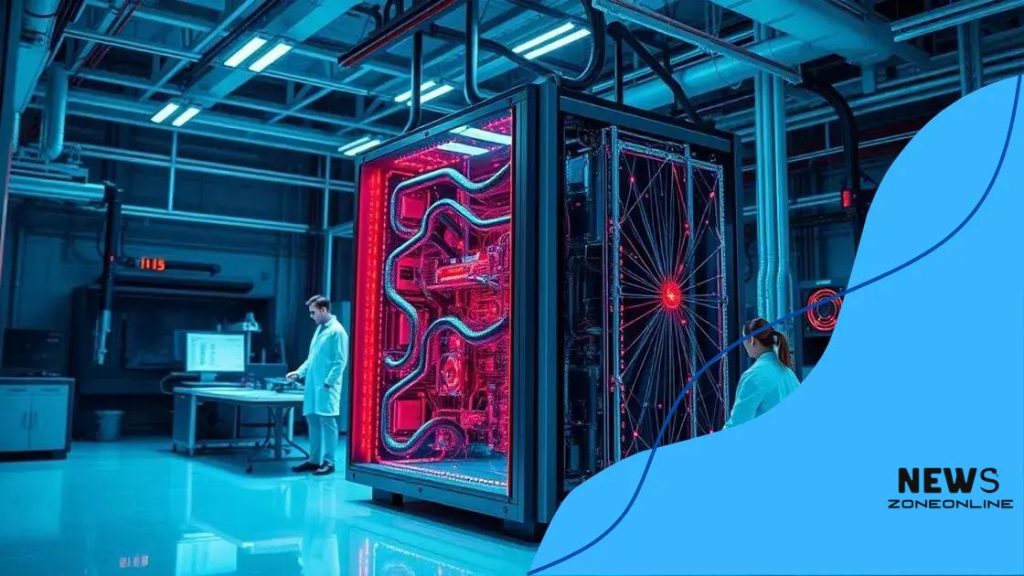Quantum computing breakthrough: national security implications

Quantum computing breakthroughs significantly impact national security by enhancing secure communications, improving intelligence gathering, and posing new cybersecurity challenges that must be addressed by defense strategies.
Quantum computing breakthrough is set to revolutionize the landscape of national security, sparking conversations about its implications for defense strategies and global stability. Have you ever wondered how this technology might change the game for nations around the world?
Understanding quantum computing
Understanding quantum computing is crucial in today’s rapidly evolving tech landscape. This innovative technology promises to solve complex problems much faster than conventional computers. But what exactly is quantum computing?
At its core, quantum computing harnesses the principles of quantum mechanics to process information. Unlike traditional computers that use bits (0s and 1s), quantum computers use qubits. These qubits can exist in multiple states simultaneously, allowing for incredibly rapid calculations and data processing.
Key concepts of quantum computing
To grasp quantum computing effectively, it’s essential to understand a few key concepts:
- Superposition: Qubits can represent both 0 and 1 at the same time, which allows quantum computers to process huge amounts of data.
- Entanglement: Qubits can be linked together, so the state of one can depend on the state of another, no matter how far apart they are.
- Quantum interference: This principle enables quantum algorithms to find solutions more efficiently by amplifying the probabilities of correct answers.
The implications of these properties are vast. Quantum computers have the potential to revolutionize various fields, including cryptography, material science, and even artificial intelligence. For instance, in cryptography, quantum computing can crack encryption codes that are currently considered secure, posing a threat to national security.
Moreover, researchers are experimenting with quantum algorithms that might outperform classical algorithms in specific tasks. This leap in processing power could inspire innovations we have yet to imagine, making it even more critical for national security experts to monitor these advancements closely.
Real-world applications
As organizations begin to explore the potential of quantum computing, various applications are emerging:
- Drug discovery: Quantum simulations could expedite the development of new medications by accurately modeling molecular interactions.
- Supply chain optimization: Businesses can enhance logistics and production efficiency through complex problem-solving.
- Financial modeling: Financial institutions can leverage quantum computing to predict market behavior and mitigate risks more effectively.
As we dive deeper into this new frontier, understanding the basic principles of quantum computing becomes essential for stakeholders across different sectors. Staying informed about these technologies can help organizations prepare for the changes they will bring.
Potential uses in national security
Potential uses in national security highlight the transformative impact of quantum computing on defense strategies. As nations explore this technology, its applications are becoming increasingly relevant across various sectors.
One significant advantage of quantum computing is its ability to process enormous datasets rapidly. This capability can be leveraged in intelligence analysis, allowing military and security agencies to identify patterns and threats more effectively.
Enhanced Encryption Techniques
Quantum computing also promises to revolutionize encryption methods. Traditional encryption methods could be vulnerable to quantum attacks. However, quantum encryption, such as quantum key distribution, ensures secure communication by using the principles of quantum mechanics.
- Unbreakable codes: Quantum encryption generates keys that are theoretically impossible to intercept without being detected.
- Data integrity: It provides a way to confirm that data has not been tampered with during transmission.
- Future-proofing: Adopting quantum encryption will prepare nations against future hacking threats.
Furthermore, quantum computing can impact logistics and supply chain management in national defense. It can optimize resource allocation during military operations, ensuring that troops are supplied adequately without delays.
Impact on Cybersecurity
The cybersecurity landscape is also at risk and benefit from quantum advancements. While quantum computers could potentially crack existing encryption, they also enable the development of advanced cybersecurity measures that utilize quantum mechanics to enhance data protection.
Governments are investing in research to protect critical infrastructure from quantum threats. By understanding quantum algorithms, defense organizations can develop countermeasures that secure sensitive data and maintain national security.
From strategic military enhancements to safeguarding sensitive communications, the potential uses of quantum computing in national security are vast. As the technology evolves, its integration into defense strategies will redefine how countries protect their assets.
Risks associated with quantum advancements

Risks associated with quantum advancements present significant challenges for national security and various industries. While quantum computing promises immense benefits, it also introduces new vulnerabilities that need careful consideration.
One of the foremost concerns is the potential for quantum computers to break traditional encryption methods. This capability puts sensitive data at risk, particularly in sectors like banking, healthcare, and government. As quantum technology advances, it becomes crucial for organizations to reassess their cybersecurity measures.
Potential Cybersecurity Threats
The cybersecurity landscape faces new threats as quantum computing evolves. Quantum computers could render existing encryption obsolete, making it easier for malicious actors to access confidential information. Some of the primary threats include:
- Data Breaches: With quantum capabilities, hackers could potentially decrypt sensitive information stored on encrypted servers.
- Identity Theft: The risk of unauthorized access increases significantly, endangering personal and financial identities.
- Undetected Attacks: Quantum developments may enable stealthier cyberattacks that traditional defense systems are unprepared to thwart.
On the other hand, developing quantum-resistant encryption becomes vital. Researchers are already working on algorithms designed to withstand quantum attacks, ensuring that data remains secure even in a future dominated by quantum technology.
Economic Implications
The economic ramifications of quantum risks extend beyond cybersecurity. Businesses may face massive financial losses due to breaches or disruptions caused by non-compliant technologies. As organizations navigate these challenges, adapting to quantum advancements will require investment in new technologies and training.
Organizations must also consider the potential for a digital arms race. Countries investing heavily in quantum technology might lead to increased tension and competition. This scenario can complicate international relations and collaboration in the tech space.
In summary, while quantum advancements hold promise, understanding and mitigating the associated risks is crucial for individuals, businesses, and governments. Fostering a proactive approach to these challenges will be key in maximizing benefits while safeguarding national interests.
Comparative analysis with traditional computing
Comparative analysis with traditional computing reveals significant differences and advantages of quantum computing over classic methods. Understanding these differences is crucial as we move into an era where quantum technology plays a vital role.
Traditional computing relies on bits, which can be either 0 or 1. This binary system limits the speed and efficiency of data processing. In contrast, quantum computing utilizes qubits, which can exist in multiple states at once. This characteristic allows quantum computers to process a vast amount of data more efficiently than classical computers.
Speed and Efficiency
When comparing the processing power:
- Quantum speed: Quantum computers can solve complex problems exponentially faster due to their ability to evaluate multiple possibilities simultaneously.
- Parallel processing: While traditional computers can handle one operation at a time, quantum computers can work on numerous operations at once.
- Problem-solving power: Quantum algorithms, like Shor’s algorithm, can factor large numbers much faster than traditional methods, impacting fields such as cryptography.
This increase in efficiency doesn’t come without challenges. Quantum computers are still in the early stages of development and face issues such as error rates and maintaining qubit coherence. Traditional computers, on the other hand, are widely used and stable but may not keep pace with the needs of future technologies.
Applications Across Different Fields
The applications of quantum computing extend far beyond mere data processing. In industries such as medicine, finance, and logistics, natural differences between quantum and traditional computing can lead to breakthroughs.
For instance, quantum computing can simulate molecular interactions in drug discovery more accurately than traditional methods. In finance, quantum algorithms might optimize investment strategies by analyzing market data at unprecedented speeds. Industries need to collaborate and understand how to integrate these advancements effectively.
As we move forward, it is crucial for organizations to evaluate their needs and consider adopting quantum technologies where applicable. By understanding these differences, businesses can better prepare for a future that blends traditional and quantum computing.
The future of quantum technology in defense
The future of quantum technology in defense is a subject of immense importance as nations strive for technological superiority. As quantum computing continues to evolve, its applications in national defense are becoming clearer and more promising.
One of the main areas where quantum technology will play a crucial role is in secure communication. Quantum key distribution (QKD) allows for the creation of encryption keys that are incredibly difficult to intercept. This technology aims to protect sensitive military communications from prying eyes and cyber threats.
Advancements in Intelligence Gathering
Data analysis is another critical area benefiting from quantum advancements. Quantum computers can process and analyze vast amounts of data quickly, enabling defense agencies to gather intelligence more efficiently. This capability enhances situational awareness and helps in decision-making processes.
- Faster threat detection: Quantum algorithms can identify potential threats much quicker than traditional methods.
- Improved predictive analysis: With advanced modeling, defense agencies can anticipate enemy movements and strategies.
- Enhanced surveillance: Quantum computing can optimize data collected from various surveillance technologies.
Furthermore, quantum technology could revolutionize logistics and supply chain management in military operations. The ability to simulate different scenarios and optimize resource distribution will ensure that troops receive necessary supplies efficiently.
Potential Challenges Ahead
Despite the promising future, some challenges must be addressed. Developing robust quantum systems that are less prone to errors is essential. Security measures must also evolve concurrently to protect quantum technologies from potential threats.
Additionally, the race for quantum dominance among nations may lead to increased military tensions and competition. As countries invest heavily in quantum research, international cooperation and treaties will be important to ensure that these powerful technologies are used responsibly.
As we look forward, the integration of quantum technology in the defense sector appears inevitable. Understanding its implications is vital for those involved in national security and technology development.
FAQ – Frequently Asked Questions about Quantum Technology in Defense
What are the main benefits of quantum technology in defense?
Quantum technology enhances secure communication, speeds up data processing, and improves intelligence gathering.
How does quantum key distribution (QKD) improve security?
QKD creates encryption keys that are extremely difficult to intercept, ensuring safe military communications.
What challenges does quantum technology face in defense applications?
Key challenges include maintaining system integrity and protecting against new cybersecurity threats.
Why is global collaboration important for quantum advancements?
Collaboration helps share knowledge and resources, ensuring that quantum technologies are used safely and effectively.





